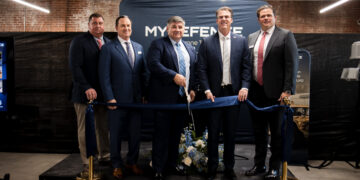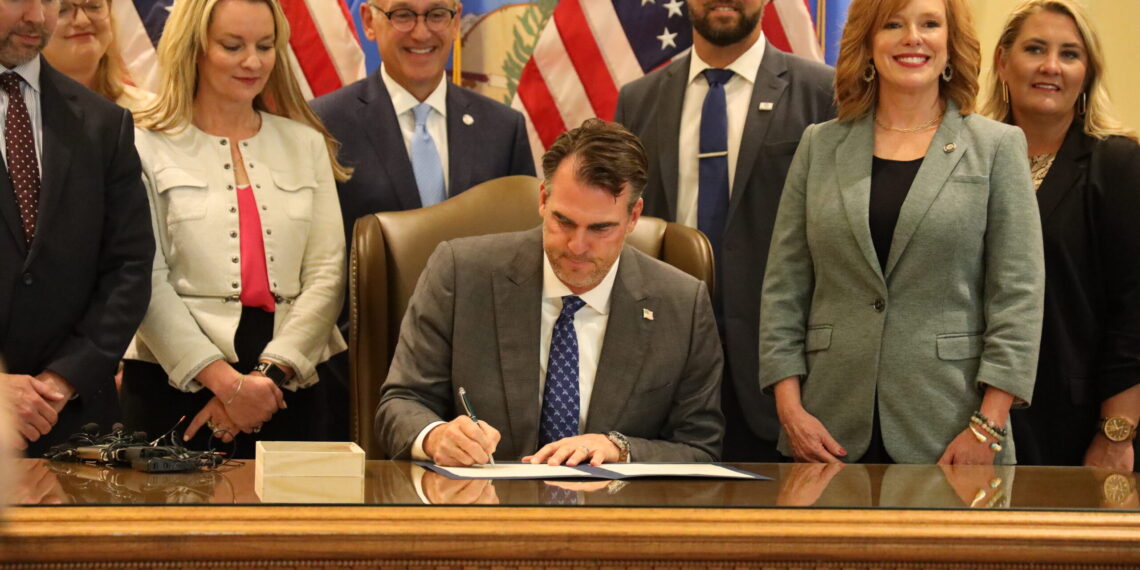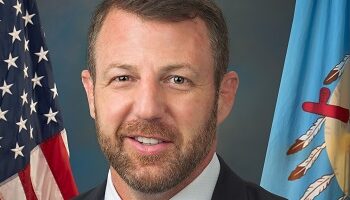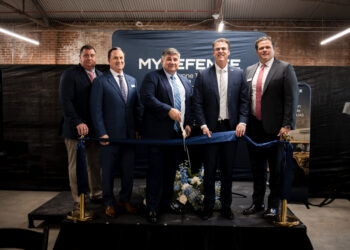OKLAHOMA CITY (OBV) – Gov. Kevin Stitt held a ceremonial signing of several bills on Tuesday, including a bill that expands high school graduation requirements to include career-readiness training.
Stitt ceremonially signed House Bill 3278, which is also known as the Graduation Act of 2024. The new law makes high school graduation requirements more flexible, allowing students to take classes that will both prepare them for their future careers and give them credit hours towards graduation. Stitt officially signed the bill into law in May.
“It’s something other countries do a better job at than we do. We’re trying to bring that to Oklahoma to make sure that every kid has a vote in their future,” Stitt said in the State Capitol’s Blue Room as he signed the bill.
Stitt was flanked by the bill’s authors, Rhonda Baker, R-Yukon, and Sen. Adam Pugh, R-Edmond, Oklahoma CareerTech Director Brent Haken, State Chamber of Oklahoma President and CEO Chad Warmington and various school officials.
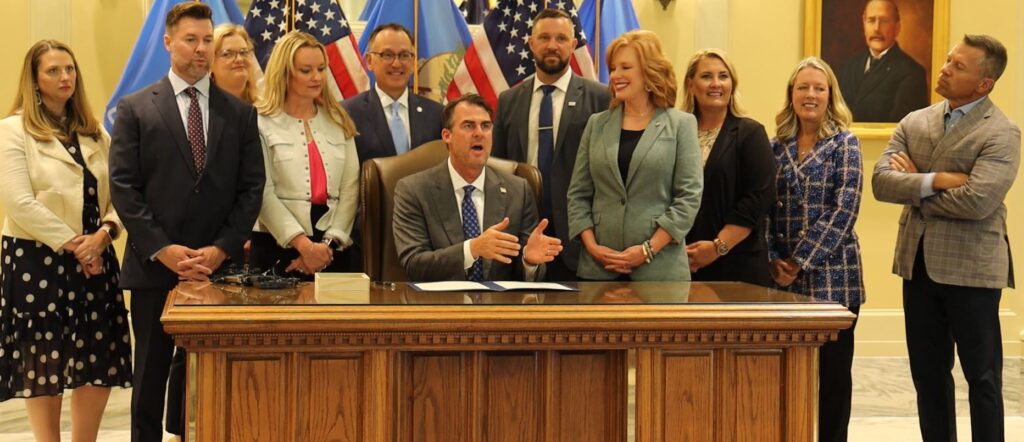
The new education-based law will reinvigorate students’ educational experience, giving them more power in building a pathway towards their future career, according to Baker.
“This is a great day for students in Oklahoma. What we have been hearing for several years is that students need pathways to meet their individual needs, to better prepare them individually for what their goals are in the future,” Baker said. “What we’ve had in the past is kind of a cookie cutter approach, and we were losing students’ interest, and when you lose their interest, you often will lose their high level of achievement. So, we’re really trying to grow this to where they have a pathway for their future, whether it be workforce development. So, they’re going to go straight into the workforce or be college ready.”
Many school district officials are enthusiastic about the educational possibilities the bill creates, according to Pugh
“I’ve heard from a few schools that are excited to have their juniors and seniors start to sign up for some of these options. But we’ll maintain a lot of flexibility for school districts,” Pugh said.
Baker and Pugh worked with the State Chamber Research Foundation, CareerTech and school officials across the state in developing the bill.
“We were able to really put something together that we feel districts will like and embrace because it does offer more flexibility for those graduation requirements,” Baker said. “It gives the students the option of choosing things that really are more pertinent to what they want.”
Warmington said the Graduation Act of 2024 is a landmark bill.
“The signing of HB 3278 was is the culmination of a lot of work from a really big and earnest group of people from the business and education communities that came together and said, ‘How do we help break down the barriers to our schools, our K-12 system, and be a real part of the workforce solutions that we’re looking for to help Oklahoma,'” Warmington said. “We’re super excited to see that working with K-12 leaders from across the state in an effort to eliminate the barriers that are going to allow more kids to get career-, college- and military-ready is going to make a real difference in Oklahoma. It’s a small move, but it’s a big move, and there’s more to come.”
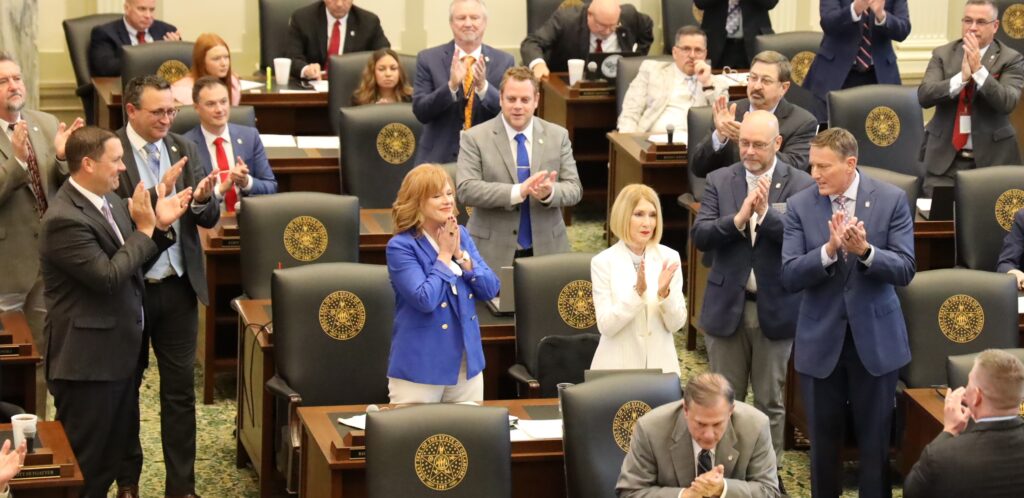
HB 3278 requires eighth through 12th grade students in Oklahoma public schools to complete modified graduation requirements starting in the 2025-26 school year.
The modified requirements include four math courses, including Algebra I and either Algebra II or Geometry.
Students must also complete six Individualized Career and Academic Plan (ICAP) pathway units that can span a range of subjects and career paths selected by the district board of education. New requirements also include a postsecondary-approved full-time CareerTech program or locally approved science-based application course to satisfy the required physical science unit.
The purpose of the modifications is to provide students training and education that will prepare them to enter the workforce upon graduation and start their career with the skills they will need to succeed.
“It’s the most significant change that we’ve seen in high school graduation requirements in decades. I’m really excited about what it’s going to do for the state of Oklahoma, most specifically the people,” Haken said. “People drive the workforce, and that’s what’s really important, because now students can pursue their passion, pursue their interests, pursue what they’re good at.”
Schools across Oklahoma already offer courses that teach students skills that they can use in their future careers, but students can now get credit for those courses.
“Now, they’re not going to get treated like they’re less than, like they’re an elective,” Haken said. “This is your plan, this is your career, this is your future. So, we’re really excited to make it happen.”
Warmington said that although fine art and foreign language classes will no longer be required to graduate, students can still choose to take those classes.
“To be clear, this is not preventing anyone from taking any classes. The beauty of this is that it doesn’t prevent anyone from doing any of those things,” Warmington said. “This language gives you flexibility. There’s a lot of misnomers about it being anti-foreign language or anti-fine art. That couldn’t be further from the truth. Those are still options for the kids who need that on their college track or who want those classes. But the kid who just really wants to get into fabrication math because he wants to be a welder, this allows them that flexibility to do that.”
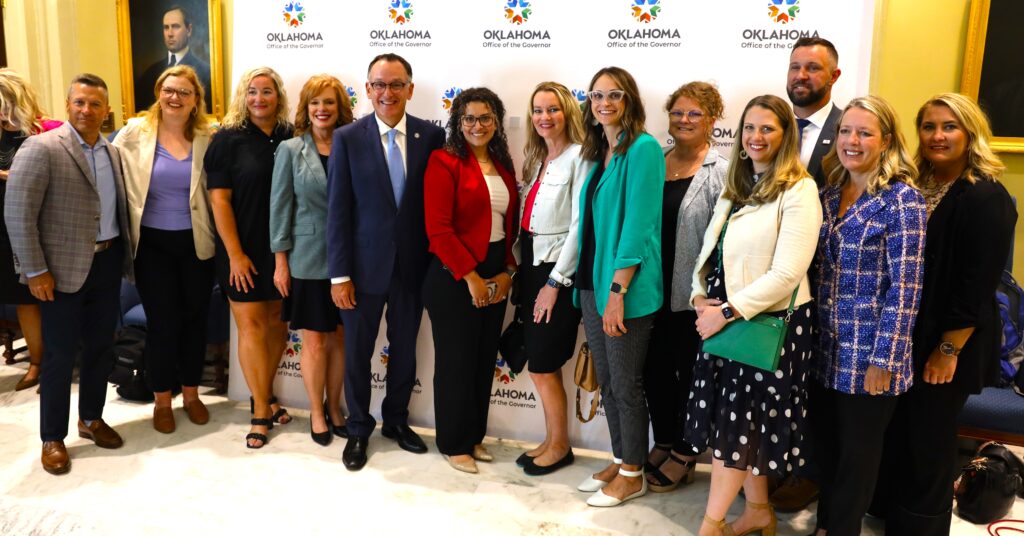
Pugh defended the bill in the Senate, saying it doesn’t eliminate foreign language and fire art courses. He said the courses will not be required to graduate, but students still have the option to take them.
“I think if the community wants those courses to be available in those school districts, that will be locally decided. And since this body has almost doubled funding for common education in the last seven years, then there’d be no reason to start taking away core courses,” Pugh said. “In fact, I think schools will actually innovate and offer more courses and be a little more unique to what those community needs would be.”
The Graduation Act of 2024 will help the state make needed gains in workforce development, Pugh said on Tuesday.
“We’ve got to fix the workforce. We know we have a huge workforce shortage. I’m going to keep talking about this. This is one big step, but it’s not the only thing that we need to do in terms of preparing the workforce and filling nearly 40,000 unfilled jobs in the state,” Pugh said. “If we want to grow our economy, we’re going to have to do it organically by growing our workforce capacity. This is one step, but I’ll keep focusing on all three legs of the education stool: CareerTech, K-12 and higher ed.”
Union Public Schools in Tulsa implemented a construction-training program in 2020 that has been popular with students. More than 1,000 students have participated in the program, learning skills that will help them in either a construction-related career after high school or in their university studies if they are pursuing an advance career in a construction-related field, such as architecture or construction management, according to Chris Payne, chief communications officer for Union Public Schools.
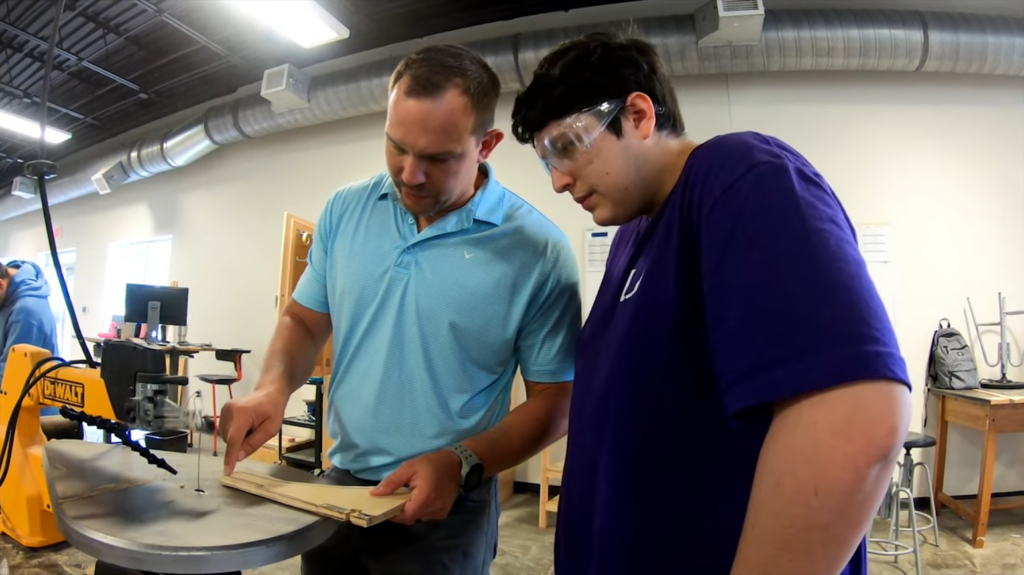
The goal, Payne said, is to make students ready for the demands of their future career and college pursuits.
“And that means providing a lot of different pathways for students to be engaged, and construction is an area where they are very happy to have the help,” Payne said. “We do want to be part of the solution in meeting the local needs for construction workers.”
Education Data Initiative statistics show that college enrollment in Oklahoma has declined 17.9 percent since 2010. EDI statistics combined with Oklahoma State Regents for Higher Education data shows that 49.45 percent of Oklahoma graduates do no attend a university or college in their first year after high school.
One of HB 3278’s goals is to provide career training to students who do not plan to go to college.
Baker, a former teacher, said her colleagues in the legislature recognize the need to add more career preparation to graduation requirements.
“I think everyone in their district has seen that there is definitely a need for the increase of flexibility and rigor,” she said. “The only concerns, I think, are for students that want to maybe go into something that doesn’t require as much math. There’s been questions about why should we require more math?”
Oklahoma has a wide range of industries, including oil and gas, aerospace, agribusiness and automotive manufacturing, among many others.
Forty-four percent of business leaders across the state said workforce and education are the top issues Oklahoma businesses face, according to the 2023 Business Leaders poll.
HB 3278 aims to help the state’s various industries by filling their workforce needs with skilled young workers looking to launch their career.
“I think what we’re doing is we’re really connecting students with businesses that need immediate workforce,” Baker said.





